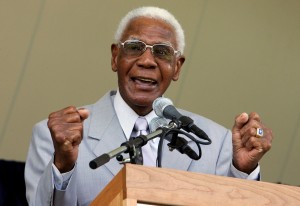Joe Posnanski on Buck O’Neil: A great writer “trusts his stuff”
When the best in the business talks about how he goes about his business, and it’s your business too, listen.
Joe Posnanski, who has offered writing advice on this blog before, has written a couple of times this week about the late Buck O’Neil, Posnanski’s longtime friend and the subject of his book “The Soul of Baseball.”
O’Neil, a standout Negro Leagues player and manager and later a scout and the first black coach in MLB, died five years ago this week.
In a blog post yesterday at SI.com, Posnanski lists O’Neil’s all-time team, the player at each position that O’Neil thought was the greatest of all time, or at least he thought that on the day Posnanski asked him about it.
But before he gets to that, Posnanski talks about the night O’Neil died, when he had an hour to write an obituary about a 94-year-old man who had lived an incredibly full life, and had recounted that life in great detail over the years the two had known each other.
Posnanski explains that one of the more morbid things journalists do, out of necessity, is write obituaries about famous people in advance, when they’re still alive. “Practicality demands it,” Posnanski writes. “They might die right on deadline. They might die while the journalist is out of the country.”
But Posnanski confesses that it’s a failing of his that he just can’t do that, and so he had nothing written when O’Neil died, after a long illness, but right smack on deadline.
Posnanski had an hour to write, and he describes what he went through. You should go read it because he tells the story better than I do, but: He struggled at first, letting 15 minutes go by with nothing to show for it. Then:
I’m not sure what clarifying thought came along to center me. I only remember thinking something like: “Well, you have to write down SOMETHING.” I have a recurring nightmare where I’m working somewhere, and it’s one minute past deadline, and my computer screen is completely blank. But I’ve always said that I don’t believe in writer’s block, because my father worked in a factory most of his life and I don’t think he ever had “factory block.” I started writing, and I kept writing, and though I had no real feel for the words I was typing, I figured that I knew Buck, and I loved Buck, and maybe that was coming through.
I would posit that it wasn’t just that Joe knew and loved Buck.
When a talented big-league pitcher is struggling, he often hears this from the pitching coach: “Trust your stuff.” Writers have to do that too.
When I wrote a daily column, people would sometimes ask me how I was able to think of something to write every day. My deadline was 11 a.m., and I used to say, truthfully, “If I haven’t thought of anything by 9, I just start typing.”
Of course, you have to have the stuff in the first place, and I don’t mean you have to be born with it. I mean you have to develop it, just as that big-league pitcher developed his craft through his years of amateur and minor league ball. I couldn’t have pulled off that 9 a.m. trick in the first few years of my career.
I once heard something about Pablo Picasso. I imagine it’s apocryphal but I don’t want to research it because I don’t want to know if it’s not true. It’s that he’d mastered every painting style in Western art before moving on to his own signature abstract style.
I want that story to be true because I believe writers have to do something similar. I don’t mean we have to master every style—sonnets continue to elude me—but we have to get the basics down, build the foundation, before we can do things like Posnanski did that night five years ago, trusting his stuff enough to just write, and come up with something worthy of his great subject that night.
What I mean is that Posnanski didn’t have to think consciously about what makes a good lead, or how he shouldn’t overload his story with adjectives, or how rhythm is important in conveying emotion.
He could just trust himself and start typing. Here’s his lead:
In a Lincoln Town Car on the way home from a funeral, Buck O’Neil said: “I don’t want people to be sad when I die. I’ve lived a full life. Be sad for the kids who die.”
So this will not be a sad column, I hope.
Buck O’Neil died Friday after a prolonged stay in a Kansas City hospital. He was 94 years old, almost 95. He lived a life for the ages.
You can read the whole thing here. Here is Posnanski’s other post this week about O’Neil, in which he asks you to donate to Buck’s beloved Negro Leagues Baseball Museum in Kansas City, which is both a worthy cause and a great place to visit.
To the extent any of us can master writing, we do it by writing a lot, being conscious of what we need to improve at and listening to feedback from editors and readers—both of which should include ourselves.
When you’ve built that foundation, you can stare at that blank screen without panicking. You can just trust your stuff.


